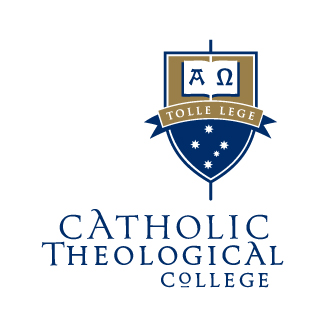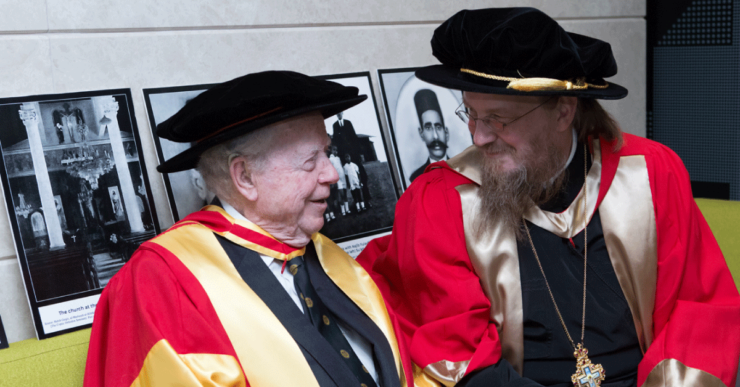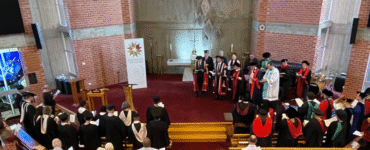(1931-2024)
Catholic Theological College and the University of Divinity mourn the passing of our esteemed colleague, Professor Gerald O’Collins SJ AC. Fr Gerald was a churchman and scholar of international and national significance, and his great capacities for scholarship, friendship, networking and supporting future generations of theologians and believers will be sorely missed. He received several honorary doctorates, including the Doctor of Divinity from the University of Divinity (then Melbourne College of Divinity) in 2007. In 2006 he was made a Companion of the General Division of the Order of Australia (AC). Fr Gerald died in Melbourne on the evening of Thursday 22 August 2024.
Born in Melbourne into a family with active involvements in church and politics, Gerry graduated from Xavier College and Melbourne University and was ordained priest in the Society of Jesus in 1963. After graduate studies at Heythrop College (UK) and the University of Cambridge, Gerry taught at Boston College (USA) and with the United Faculty of Theology (in the Melbourne College of Divinity), teaching at JTC and CTC in the early 70’s. In 1973 Gerry took up a teaching position at the Pontifical Gregorian University (Rome), where he served in a number of positions, including Dean of the Theology Faculty, until 2006. He held honorary positions with St Mary’s University Twickenham (UK) and the Australian Catholic University. Returning to reside in Parkville, Gerry was generous in his support for CTC and the University of Divinity, as honorary researcher, research supervisor and mentor to staff and students.
Fr Gerald was a prodigious writer, publishing for academic, professional and popular audiences. He published hundreds of articles and over 75 books on theological topics. At the centre of Gerry’s academic work was the figure of Jesus Christ, whose presence, person, work, priesthood, beauty, inter-religious significance and spiritual richness enlivened Gerry’s theological imagination, and communication of whom energised Gerry’s unstoppable output. His texts on Christology and his international collaboration and publications on key topics in Christology: Resurrection, Trinity, Incarnation, Redemption, are a reference point in the discipline. He was an expert and an advocate of the Second Vatican Council, especially its Dogmatic Constitution of Divine Revelation. This document’s rich understanding of tradition and scripture provided the basis for his strong ecumenical commitments, as well as his life-long engagement with biblical scholarship. Gerry also published on the popes, on his own family history, and on the experiences of his life and work around the world.
Gerry’s intelligence, humour and kindness endeared him to friends old and new. He relished the company of friends and colleagues, and maintained warm contacts with family and friends as well as his fellow Jesuits. During his decades in Rome, he was highly regarded by faculty and students, in particular the many international students (including Australian graduate priests) he encouraged and supported as doctoral supervisor and as dean. Always a pastor at heart, Fr Gerry offered retreats and spiritual direction to many communities and individuals. He was a highly valued member of the Order of Malta, serving as Principal Chaplain to the Subpriory of the Immaculate Conception in Victoria.
We give thanks to God for the life and work of Fr Gerald O’Collins SJ and commend him to the risen Lord whom he so wholeheartedly served in this world. We extend our condolences and prayers to the Society of Jesus and to Fr Gerry’s family and friends.
On the Death of Fr Gerald O’Collins SJ
Published by Archbishop Mark Coleridge, the Archdiocese of Brisbane
The Catholic Church in South East Queensland
I first met Gerald O’Collins in 1971 when I was a seminarian at Corpus Christi College Glen Waverley in what was then called first year Theology and he was a young and rather glamorous teacher of theology who seemed to know everything and everyone. Those were the days when he was teaching half the year in Boston and half the year in Melbourne; and that added to the sense of glamour and excitement.
Fr O’Collins taught one of the three most influential courses in my seminary training, Fundamental Theology or, as it became under Gerry, the Theology of Revelation. He opened to us the great vision of the Second Vatican Council’s teaching on Revelation. He taught us that Jesus was the revelation; and that for me was…well, revelatory. Gerry made theology seem not only relevant but exciting; and he also gave us a sense of the Church universal which was itself exciting and even liberating.
Gerry was a great encourager. It was he who suggested that I submit an essay I’d done for him for publication in Compass. This seemed a bridge too far for me, but I followed his advice. The piece was published, and thus began my modest publishing career. Through the years Gerry not only taught his students: he befriended them. That’s why many of those he taught and mentored became his lifelong friends. Beyond the academic setting, his gift for friendship was one of the reasons why he was such a remarkable networker. That was why Rome, still one of the great global crossroads, suited him so well.
I crossed paths with Gerry again when I went to study in Rome at the Biblicum in 1980. He had already been teaching for some years at the Gregorian University, just across the piazza from the Biblical Institute. I met him often enough in the piazza or at various celebrations, and he was an unfailing source of encouragement in those early years when adjustment to Roman life wasn’t always easy.
At the Gregorian, Gerry was known for various things, apart from his teaching of theology and the flow of his publications. He was known for his celebrated Australian accent when he spoke Italian. He knew the language as well as anyone; it’s just that the sound was pure Chips Rafferty. But more importantly he was known as a teacher who had a genuinely pastoral concern for his students, which was unusual in the Roman universities at that time. This was another aspect of Gerry’s gift of friendship.
Later in life when I was asked to work in the Holy See’s Secretariat of State, I crossed paths with Gerry once again. He was as much a man of the Church as he had always been, but his dealings with the Holy See had grown more complex, especially after the sanctioning of Fr Jacques Dupuis SJ to whom Gerry was close. It was always puzzling to me that Gerry was never appointed to the International Theological Commission where he would have contributed so well.
In those years I met him mainly at the table of Desmond O’Grady, the Australian writer and journalist who had long lived in Rome. Des was a friend to us both who was deeply interested in the Church but very much a man of the wider world. That was also true of Gerry who was always a Church man but never an ecclesiastical apparatchik. He was given to theology but not to ideology. A son of St Ignatius, he believed in the dialogue with culture and was at home in any company.
Gerry’s ceaseless writing, like his teaching, rose from a lifelong encounter with Jesus Christ crucified and risen. He seemed almost haunted not just by the question of Jesus but by the presence of Jesus. He also seemed one who needed a manuscript under way in order to give shape and direction to his life, both intellectually and spiritually. He had the training of a systematic theologian but the instincts of a New Testament scholar; and he also had the journalist’s ability to write accessibly and attractively. That was an unusual and potent combination which gave Gerry a voice that will be heard beyond his death.
Above all, however, Gerald O’Collins was a Jesuit priest who understood what it was to give his life “for the greater glory of God”. Pope St Paul VI said that people these days “listen more willingly to witnesses than to teachers, and if they listen to teachers it is because they are witnesses” (Evangelii Nuntiandi, 41). In bidding farewell to Fr Gerald O’Collins SJ, we give thanks for one to whom people listened because he was both teacher and witness, priest and friend. May he rest in peace and rise in glory.

Catholic Theological College is a college of the University of Divinity from the Catholic tradition, based in Melbourne, Victoria.







[…] Further information can be found here […]
Reading about the remarkable life and contributions of Reverend Professor Gerald Glynn O’Collins SJ AC, one cannot help but reflect on the immense impact he had on theological scholarship and the broader Christian community. His work, particularly in Christology and his dedication to the Second Vatican Council, has left an indelible mark on both academia and faith. How do you think his legacy will continue to influence future generations of theologians and believers?